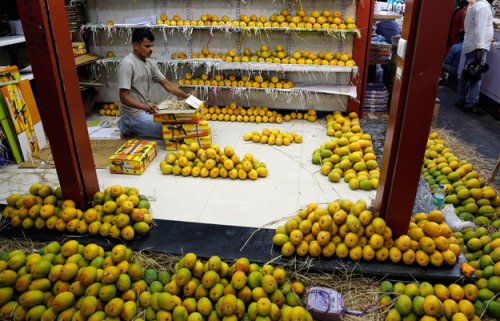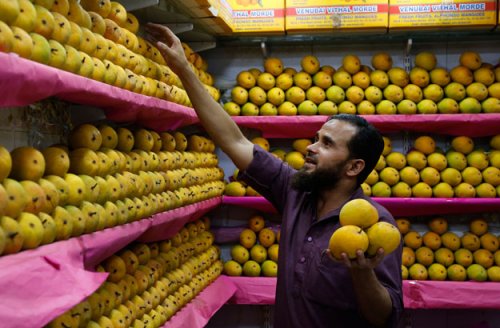
AFP | 18 May 2014
Pulp friction: Indian mango ban prompts protest in Britain
Many British Indians are resigned to going without their favourite Alphonsos for now, while the businesses who supply them are losing out financially.
A ban on European imports of India’s Alphonso mango — prized for its perfumed aroma and buttery flesh — is drawing anger from British Indians, who say the move is unfair and deprives them of one of summer’s sweetest flavours.
The “king of fruits” and other Indian mangoes were banned by the European Union from May 1 after fruit flies which officials said could threaten crops were found in shipments last year.
While a fightback has been launched, many British Indians are resigned to going without their favourite Alphonsos for now, while the businesses who supply them are losing out financially.
Ahmed Khan, working on his stall in Tooting, south London, an area with a large south Asian population, said the move would hit him hard.
“It’s not fair — it’s going to mean we miss out on half our mangoes this year, half our business,” Khan, 55, told AFP.
“Life is too short for politicians to interfere — I hear they are now exporting Alphonsos to Pakistan, because there is a glut and they are very cheap.”
Rohit Shah, of nearby Bhavin’s grocers, said the Alphonso, which can be eaten alone or used in everything from lassis to chutney, had no rival in terms of taste.
“It’s the smoothness of the flesh and the unique flavour — the flesh is fibreless which is what makes them so good,” said Shah, 62.
“Even during the time of the British Empire they said they were the best.”

Britain, the former colonial power in India, has the EU’s largest Indian diaspora community. British Indians number around 1.4 million out of a total population of some 60 million.
Citing pressure from disappointed constituents, one lawmaker raised the ban in the House of Commons last week.
Keith Vaz said British citizens consumed 12 million mangoes last year alone and predicted the ban, due to run to December 2015, could cost British businesses over £10 million ($16.8 million, 12.3 million euros).
“The EU has treated an important trading ally, which represents a sixth of the population of the globe, with disrespect,” said Vaz, of the opposition Labour party, in a special debate.
“The Brussels sprouts have decided to take on the mighty mango. I know whose side I am on.”
A petition to the British government urging a reversal of the ban on Alphonso mangoes — first grafted in Portugal’s Indian colonies in the 1500s — has attracted over 2,300 signatures.
Prime Minister David Cameron has pledged to raise the issue with his new Indian counterpart, expected to be Narendra Modi following his party’s landslide win in the general election.
Some, including Vaz, also argue that the issue could have wider repercussions for trade relations with India at a crucial point.
Talks between India and the EU on free trade have been dragging on since 2007 and India has threatened to take the EU to the World Trade Organisation over the ban, warning it could have “very negative fallout”.
“With a new Indian government expected to put long-stalled EU free trade talks at the top of its agenda, the mango ban could not have come at a worse time as it risks souring discussions before they even get going,” Allie Renison of business lobby group the Institute of Directors wrote in the Daily Telegraph.
“But while the geopolitics of trade rattle on, financial losses incurred by thousands of businesses importing and selling India’s lucrative Alphonso mangoes will accrue by the day.”